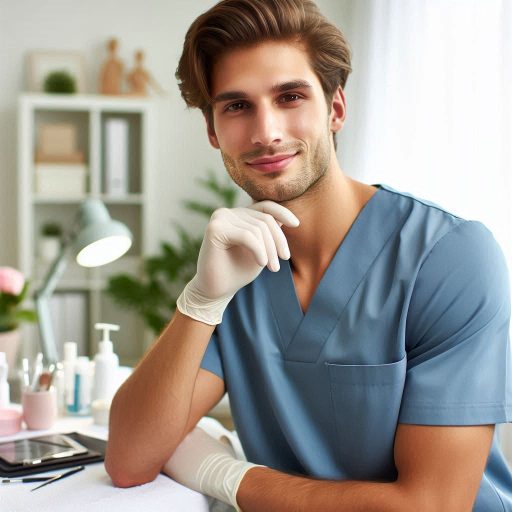Introduction
Esthetician services involve treatments aimed at improving skin health and appearance.
These services include facials, waxing, and exfoliation.
Maintaining hygiene in esthetician services is critical to ensure clients’ safety and satisfaction.
Estheticians work closely with the skin, making cleanliness a top priority in preventing infections and irritations.
Proper hygiene protects clients from harmful bacteria, viruses, and skin issues.
By keeping tools, surfaces, and hands clean, estheticians safeguard against the transmission of diseases.
Sterilizing tools, using disposable equipment, and practicing proper handwashing prevent cross-contamination.
Ensuring a sanitary environment also fosters trust between estheticians and clients, contributing to business success.
Adhering to strict hygiene protocols demonstrates professionalism and commitment to high-quality service.
Clients are more likely to return when they feel confident that their health is prioritized.
Hygiene is not only a health concern but also enhances the overall experience of esthetician services.
Following these practices guarantees a clean, safe, and comfortable setting for clients to enjoy treatments.
Hygiene in esthetician services is essential for both safety and satisfaction.
It promotes client trust and contributes to a professional reputation.
Estheticians should make cleanliness a cornerstone of their practice, ensuring a safe, healthy experience for everyone involved.
Hygiene in skincare treatments
Preventing Cross-Contamination
Maintaining a high level of hygiene in esthetician services is crucial to prevent cross-contamination between clients.
Tools and equipment used during treatments must be thoroughly sanitized and disinfected to avoid the spread of bacteria and infections.
Facial Treatments
During facial treatments, estheticians come in direct contact with clients’ skin.
Therefore, it is essential to ensure that hands are washed thoroughly before touching the face.
Clean gloves should also be worn to prevent the transfer of oils and bacteria.
Transform Your Career Today
Unlock a personalized career strategy that drives real results. Get tailored advice and a roadmap designed just for you.
Start NowChemical Peels
Chemical peels involve the use of strong acids to exfoliate the skin.
Proper hygiene practices, such as using clean applicators and wearing gloves, are necessary to prevent any adverse reactions or infections.
Ensuring that the treatment area is clean and sterile is vital to avoid any complications.
Skincare Tools and Equipment
Tools such as extraction tools, tweezers, and brushes used in skincare treatments must be cleaned and sanitized after each use.
Failure to do so can lead to the spread of bacteria and infections, causing harm to the client’s skin.
Sanitization Protocols
Estheticians should follow strict sanitization protocols to ensure that all surfaces, tools, and equipment are properly cleaned and disinfected.
This helps in maintaining a safe and hygienic environment for clients and prevents the risk of infections.
Client Safety
Prioritizing hygiene in esthetician services is not only important for the esthetician but also for the safety and well-being of the clients.
By maintaining a clean and hygienic workspace, clients can feel confident that they are receiving safe and effective treatments.
Regulatory Standards
Health and safety regulations set by regulatory bodies require estheticians to adhere to strict hygiene practices to ensure the health and well-being of clients.
Failure to comply with these standards can result in penalties and loss of credibility.
Professionalism
Maintaining high standards of hygiene in esthetician services is a sign of professionalism and dedication to client care.
It reflects the esthetician’s commitment to providing quality services in a safe and hygienic environment.
Education and Training
Proper education and training in hygiene practices are essential for estheticians to understand the importance of cleanliness in skincare treatments.
Continuous learning and updates on best practices help in staying informed and up-to-date with the latest hygiene protocols.
In fact, the importance of hygiene in esthetician services cannot be overstated.
Cleanliness and proper hygiene practices are essential in preventing the spread of bacteria and infections, ensuring client safety, and maintaining professionalism.
Estheticians must prioritize hygiene to provide safe and effective skincare treatments.
Read: Esthetician Work Environment: What to Expect
Tools and equipment sanitization
When it comes to esthetician services, hygiene is of utmost importance.
Transform Your Career Today
Unlock a personalized career strategy that drives real results. Get tailored advice and a roadmap designed just for you.
Start NowThis is especially true when it comes to the tools and equipment used in providing these services.
Importance of regularly cleaning and sanitizing esthetician tools and equipment
Regularly cleaning and sanitizing esthetician tools and equipment is crucial for client safety and satisfaction.
Clean tools prevent the spread of harmful bacteria, reducing the risk of infections.
When tools are sanitized properly, it enhances the overall hygiene of the salon, creating a safer environment.
Clients trust professionals who prioritize cleanliness, knowing their health won‘t be compromised.
How dirty tools can lead to skin infections and other health issues for clients
Failure to sanitize tools can lead to serious health issues, including skin infections.
Bacteria and other pathogens thrive on unclean equipment, increasing the risk of irritation and disease.
Estheticians who neglect proper cleaning procedures risk their clients’ health, which can damage their reputation.
Dirty tools can transmit viruses and infections like folliculitis or fungal conditions, impacting the client‘s skin.
Implementing strict cleaning protocols ensures the health and safety of every client.
Regular sanitization helps eliminate the risk of cross-contamination between clients.
Tools like tweezers, scissors, and brushes must be disinfected after each use.
Using hospital-grade disinfectants or autoclaves ensures tools are fully sterilized and safe for the next client.
Clean workstations also reflect professionalism, helping to build long-term trust with clients.
A salon with unsanitary conditions can drive clients away and lead to potential legal consequences.
Estheticians must follow local health regulations to maintain a clean, welcoming environment.
In summary, properly cleaning and sanitizing tools and equipment is a non-negotiable aspect of esthetician services.
It protects clients from infections, promotes professional standards, and ensures compliance with hygiene regulations.
Estheticians who prioritize hygiene create safer, more trustworthy environments that keep clients coming back.
Read: Balancing Work and Life as an Esthetician
Transform Your Career Today
Unlock a personalized career strategy that drives real results. Get tailored advice and a roadmap designed just for you.
Start NowSanitization of workstations
Sanitization of workstations is crucial in esthetician services for various reasons:
Importance of maintaining clean workstations for esthetician services
- Ensures a safe and hygienic environment for clients
- Prevents the spread of infections and bacteria
- Builds trust and credibility with clients
- Complies with industry standards and regulations
- Enhances the overall client experience
How cluttered and dirty workstations can create an unprofessional environment for clients
- Clutter can lead to accidents and injuries during services
- Dirty tools and surfaces can cause skin irritations and infections
- Clients may perceive the esthetician as unorganized and careless
- Lack of cleanliness can deter clients from returning for future services
- A clean workstation reflects professionalism and attention to detail
Overall, maintaining clean and sanitized workstations is essential in providing high-quality esthetician services and fostering a positive client experience.
Read: How to Improve Your Esthetician Techniques

Personal hygiene of estheticians
Estheticians play a crucial role in providing skin care treatments and services to their clients.
Personal hygiene is essential for estheticians as it reflects professionalism and ensures the safety and well-being of their clients.
Why is personal hygiene important for estheticians?
Maintaining personal cleanliness is non-negotiable for estheticians.
It not only creates a positive impression but also prevents the spread of bacteria and infections during facial treatments and other services.
Clients trust estheticians to provide them with safe and hygienic treatments.
By prioritizing their own hygiene, estheticians can instill confidence in their clients and build a strong reputation for quality services.
How unkempt estheticians can negatively impact the client’s experience
When estheticians neglect their personal hygiene, it can have several negative consequences for the client’s experience.
Unclean clothes, unwashed hair, or unpleasant body odor can create discomfort and a lack of trust in the esthetician’s abilities.
Clients expect a clean and professional environment when they visit a spa or salon for esthetician services.
An unkempt esthetician can lead to a sense of unease and dissatisfaction, affecting the overall quality of the treatment and diminishing the client’s enjoyment.
Tips for estheticians to maintain personal hygiene
- Always wear clean and professional attire, including a uniform or apron to protect clothing.
- Maintain good personal grooming habits, such as daily showers, clean nails, and neat hair.
- Use deodorant and fragrance in moderation to prevent body odor without overwhelming the client with strong scents.
- Wash hands thoroughly before and after each client interaction to prevent the spread of germs and maintain cleanliness.
- Regularly clean and sanitize tools and equipment used during treatments to ensure the safety and well-being of clients.
By following these tips and maintaining personal hygiene, estheticians can provide a welcoming and professional experience for their clients.
Cleanliness is a fundamental aspect of esthetician services that should never be overlooked.
Read: Top Esthetician Certification Programs
Importance of clean linens and towels
When it comes to providing esthetician services, maintaining proper hygiene is crucial for the health and safety of both clients and estheticians.
One key aspect of hygiene in esthetician services is the use of clean linens and towels.
How using clean linens and towels can prevent the spread of bacteria
By using clean linens and towels, estheticians can create a safe and hygienic environment for their clients.
Bacteria thrive in damp and dirty environments, and using contaminated linens can easily transfer harmful bacteria from one client to another.
Transform Your Career Today
Unlock a personalized career strategy that drives real results. Get tailored advice and a roadmap designed just for you.
Start NowRegularly washing and changing linens and towels between clients is essential to prevent the spread of germs and bacteria.
This practice not only ensures the health and safety of clients but also helps maintain the reputation and credibility of the esthetician.
How dirty linens can cause skin irritations and infections for clients
Dirty linens can harbor various types of bacteria, fungi, and viruses that can cause skin irritations, rashes, and even infections.
Clients with sensitive skin or compromised immune systems are especially at risk when exposed to unclean linens.
Properly laundering linens and towels with hot water and disinfectants can effectively kill germs and bacteria, reducing the risk of infections and promoting a clean and sanitary environment.
Estheticians should follow strict protocols for laundering linens to ensure they are properly sanitized and free of contaminants.
Additionally, using disposable or single-use linens and towels can further minimize the risk of cross-contamination and ensure the highest level of hygiene in esthetician services.
Disposable linens are convenient, cost-effective, and provide an extra layer of protection for clients against harmful bacteria.
Estheticians should also educate their clients about the importance of clean linens and towels in maintaining good hygiene during esthetician services.
By explaining the risks associated with dirty linens and highlighting their commitment to hygiene, estheticians can build trust and loyalty with their clients.
In general, the use of clean linens and towels is essential for preventing the spread of bacteria, protecting clients from skin irritations and infections, and maintaining a safe and hygienic environment in esthetician services.
By prioritizing hygiene and implementing proper sanitation practices, estheticians can ensure the health and well-being of their clients while delivering high-quality services.
Uncover the Details: Technological Advances in the Flight Attendant Role
Discover More: Remote vs. On-Site Data Entry Jobs in the Service Sector
Benefits of hygiene in maintaining a professional reputation
Building Trust with Clients
Practicing good hygiene is crucial for estheticians as it helps them build trust with their clients.
Clients expect the highest level of cleanliness and hygiene when receiving esthetician services, and maintaining these standards can help estheticians establish a solid reputation.
When clients see that an esthetician prioritizes hygiene, they are more likely to trust the esthetician’s skills and expertise.
This trust is essential for building long-lasting relationships with clients and ensuring they return for future services.
Attracting and Retaining Clients
Cleanliness plays a significant role in attracting and retaining clients.
A clean and hygienic environment not only creates a positive first impression but also ensures the client’s safety and well-being during the service.
Transform Your Career Today
Unlock a personalized career strategy that drives real results. Get tailored advice and a roadmap designed just for you.
Start NowClients are more likely to choose an esthetician who maintains high standards of hygiene over one who does not prioritize cleanliness.
By investing in proper sanitation practices, estheticians can set themselves apart from the competition and attract a loyal client base.
In review, the importance of hygiene in esthetician services cannot be overstated.
By prioritizing cleanliness, estheticians can build trust with clients, attract new clients, and retain their existing client base.
Practicing good hygiene is not just a professional requirement but a crucial aspect of providing quality esthetician services.
Delve into the Subject: Baggage Handler Work Environment and Conditions
Impact of hygiene on client satisfaction
Hygiene plays a crucial role in esthetician services as it directly impacts client satisfaction.
Let’s explore the impact of hygiene on client satisfaction and why it is essential for the success of esthetician services.
How clean and hygienic practices can enhance the client’s overall experience
Cleanliness creates a sense of trust and professionalism in the client-esthetician relationship.
Proper hygiene practices help prevent the spread of bacteria and infections during treatments.
A well-maintained and hygienic environment promotes a sense of well-being and relaxation for the client.
Clients are more likely to return for services when they feel comfortable and cared for in a clean setting.
Why client satisfaction is crucial for the success of esthetician services
Satisfied clients are more likely to become repeat customers and recommend the esthetician to others.
Positive reviews and word-of-mouth referrals from satisfied clients can attract new customers to the business.
Client satisfaction is directly linked to the esthetician’s reputation and success in the industry.
Building a loyal clientele base relies on providing exceptional service and meeting the client’s expectations.
In a nutshell, maintaining high standards of hygiene in esthetician services is vital for both client satisfaction and the success of the business.
By prioritizing cleanliness and creating a positive experience for clients, estheticians can build a loyal following and grow their reputation in the industry.
Conclusion
Hygiene in esthetician services is crucial for client safety and overall satisfaction.
Estheticians must prioritize cleanliness to prevent infections and maintain a positive reputation.
Transform Your Career Today
Unlock a personalized career strategy that drives real results. Get tailored advice and a roadmap designed just for you.
Start NowBy following strict hygiene protocols, estheticians can ensure a healthy and safe environment for their clients.
Regular sanitation of tools and equipment, as well as proper disinfection of work areas, are essential.
Overall, prioritizing hygiene in esthetician services not only benefits clients but also enhances the esthetician’s professionalism.
[E-Books for Sale]
The Big Book of 500 High-Paying Jobs in America: Unlock Your Earning Potential
$19.99 • 500 High-Paying Jobs • 330 pages
Explore 500 high-paying jobs in America and learn how to boost your career, earn more, and achieve success!
See All 500 High-Paying Jobs of this E-Book
1001 Professions Without a Degree: High-Paying American Jobs You Can Start Now
$19.99 • 1001 Professions Without a Degree • 174 pages
Discover 1001 high-paying jobs without a degree! Unlock career tips, skills, and success strategies for just $19.99!




